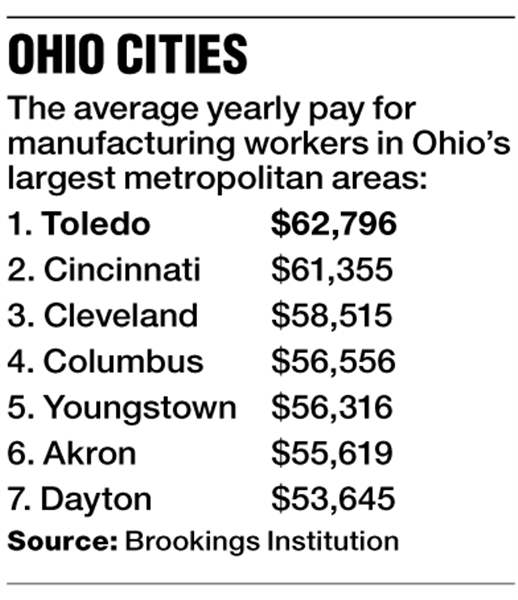
Metro area ranks 1st in state in factory pay
5/9/2012

A new study has found manufacturing employees in metro Toledo are paid a better average wage than their counterparts in any other part of the state.
According to the Brookings Institution, the average manufacturing wage in metro Toledo was $62,796 in 2010 -- not bad for an industry that has long been called dead by the popular narrative.
The study, which was released today, sought to dig deeply into the geography of manufacturing.
Researchers say they found U.S. manufacturing to be more specialized and clustered than in the past and found great differences between areas -- pay being one of them.
The report said wages averaged $35,000 in McAllen, Texas, and they reached nearly $145,000 in San Jose, Calif.
Metro Toledo came in 34th out of the top 100 for all manufacturing. Its "very high-tech" and "moderately high-tech" sectors as defined by Brookings did even better, with each ranking 24th. The overall average wage paid to manufacturing employees in the United States was $58,485.
Gbenga Ajilore, an associate professor of economics at the University of Toledo, said the relatively high wages in the rebounding auto industry probably helped push Toledo higher than areas such as Cincinnati or Columbus, which have little auto exposure. And although that number is impressive, he wondered if some high-tech fields were inflating the average somewhat.
"If we had information about the median wage, is that the top in Ohio?" he asked. "The median wage would speak more toward what everybody is doing in the manufacturing sector."
Howard Wial, a Brookings fellow and co-author of the report, did not have specific research available but said that places with high manufacturing wages tend to have relatively high wages across all specialties. He agreed that the auto industry probably was a contributing factor.
The other area in which Toledo ranked high was its reliance on manufacturing.
Whether that's good or bad depends on how you view the long-term prospects of U.S. manufacturing and how Toledo will fit into that.
Brookings said 12.4 percent of Toledo's jobs are in manufacturing, compared with 8.5 percent nationwide. Out of the nation's top 100 metro areas, that's 10th highest.
"I think it's fantastic," said Paul Zito, vice president of international development with the Regional Growth Partnership.
"We do market Toledo and northwest Ohio as the heart of the new manufacturing economy, and that's something that was developed by the Toledo regional branding initiative after much debate.
"I think the Regional Growth Partnership and the people involved in the branding initiative decided to emphasize what Toledo has been strong in historically, and that has been manufacturing."
The study found that manufacturing tends to cluster by sector, with each metro area having at least one specialization.
Researchers found Toledo's core industry is transportation. Nearly 20 percent of the Toledo area's manufacturing jobs were related to motor vehicles and parts.
Mr. Ajilore is less bullish on manufacturing's long-term future.
"We need to diversify, but diversify to what?" he asked. "One thing we did was looking to green energy. We put a lot of time and energy to that, and it hasn't panned out yet."
But the evolution of an economy has to happen organically, he said. Government and planning boards can help an industry, but they can't create one anywhere they like.
"In 1910 somebody didn't go to Henry Ford and say, 'You need to start building cars,' " he said. "It just happened."
Mr. Wial said the takeaway is that cities, business owners, and labor need to identify what they do well and build upon it with high-tech, specialized jobs of a similar type.
"If we want to strengthen manufacturing, we have to do it in a way that plays to and enhances the strengths we already have in different metro areas. The moral of the story is you need to know your manufacturing."
Mr. Zito said he believes Toledo is a great example of that.
"Historically it's a glass city," he said. "Many people can trace the growth of the solar energy in Toledo to its history in glass. That expertise in manufacturing came from Toledo 100 years ago -- from being a manufacturer of glass dishware to high-tech automotive glass, to fiber glass, now to having expertise in solar technologies."
Another finding of the report: the southern migration of manufacturing seems to have slowed.
From 2000 to 2010, the Midwest and South each lost about a third of their manufacturing jobs. However, the rate at which jobs are returning is more than twice as fast in the Midwest. The report said the number of Midwest manufacturing jobs grew 5 percent between the first quarter of 2010 and the last quarter of 2011.